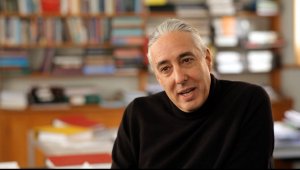Presented By: Eisenberg Family Depression Center
Renowned psychology, epidemiology, and genetics expert to deliver Psychiatry's 2nd annual Greden Lecture
Duke's Avshalom Caspi to present "Young Children's Self-control and the Health and Wealth of their Nationâ€

Mark your calendars for a presentation by Duke University's Avshalom Caspi, who will discuss “Young Children's Self-control and the Health and Wealth of their Nation” at the U-M Department of Psychiatry's 2nd-annual John F. Greden Scholar in Residence Lecture on April 3.
Policy-makers are considering large-scale early intervention programs to enhance children's self-control, with the aim of reducing crime and improving citizens' health and wealth. Experimental studies and economic analyses are suggesting that such programs could reap benefits for a nation. Yet, how important is childhood self-control for the health, wealth, and public safety of the adult population? Could early interventions enhancing the population's self-control skills reduce taxpayer costs of crime control, health care, and old-age dependency? This talk will review evidence from a number of population-representative cohort studies and discuss the implications of their findings. Continuing education credits are available.
Dr. Caspi is the Edward M. Arnett Professor of Psychology & Neuroscience at Duke. His research spans the fields of psychology, epidemiology, and genetics. His current work is concerned with these questions:
* How do childhood experiences shape the course of health inequalities across the life span?
* How do genetic differences between people shape the way they respond to their environments?
* What are the best ways to assess and measure personality differences between people?
Dr. Caspi’s recent honors include a A.W. Mellon Visiting Fellowship at the University of Capetown, South Africa, the Klaus J. Jacobs Research Prize for Productive Youth Development, and the NARSAD Ruane Prize for Outstanding Achievement in Childhood Psychiatric Disorders.
Dr. Caspi will also present a talk on “The Ballad of the Serotonin Transporter Gene” on April 2 at 4 pm in the Kahn Auditorium at the Biomedical Science Research Building (BSRB), 109 Zina Pitcher Place.
Policy-makers are considering large-scale early intervention programs to enhance children's self-control, with the aim of reducing crime and improving citizens' health and wealth. Experimental studies and economic analyses are suggesting that such programs could reap benefits for a nation. Yet, how important is childhood self-control for the health, wealth, and public safety of the adult population? Could early interventions enhancing the population's self-control skills reduce taxpayer costs of crime control, health care, and old-age dependency? This talk will review evidence from a number of population-representative cohort studies and discuss the implications of their findings. Continuing education credits are available.
Dr. Caspi is the Edward M. Arnett Professor of Psychology & Neuroscience at Duke. His research spans the fields of psychology, epidemiology, and genetics. His current work is concerned with these questions:
* How do childhood experiences shape the course of health inequalities across the life span?
* How do genetic differences between people shape the way they respond to their environments?
* What are the best ways to assess and measure personality differences between people?
Dr. Caspi’s recent honors include a A.W. Mellon Visiting Fellowship at the University of Capetown, South Africa, the Klaus J. Jacobs Research Prize for Productive Youth Development, and the NARSAD Ruane Prize for Outstanding Achievement in Childhood Psychiatric Disorders.
Dr. Caspi will also present a talk on “The Ballad of the Serotonin Transporter Gene” on April 2 at 4 pm in the Kahn Auditorium at the Biomedical Science Research Building (BSRB), 109 Zina Pitcher Place.